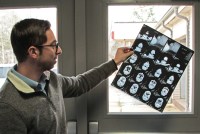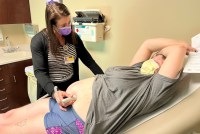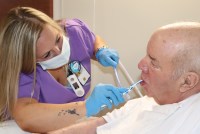Latest KFF Health News Stories
In an industry obsessed with consumer satisfaction national patient surveys still don’t get at an important question: Are hospitals delivering culturally competent care?
Hospitals Cut Jobs and Services as Rising Costs Strain Budgets
More than two years into the pandemic, hospital budgets are beginning to crack. One of the biggest drivers of financial shortfalls has been the cost to find workers.
La pandemia ha intensificado una escasez prolongada de trabajadores de salud que ha afectado especialmente a los grandes estados rurales como Montana.
The $18,000 Breast Biopsy: When Having Insurance Costs You a Bundle
An online calculator told a young woman that a procedure to rule out cancer would cost an uninsured person about $1,400. Instead, the hospital initially charged almost $18,000 and, with her high-deductible health insurance, she owed more than $5,000.
For Kids With Kidney Disease, Pediatric Expertise Is Key — But Not Always Close By
A study published in JAMA leads to questions about the uneven distribution of pediatric nephrologists nationwide. Children with end-stage kidney disease feel the impact.
Some Rural Hospitals Are in Such Bad Shape, Local Governments Are Practically Giving Them Away
Coming out of the pandemic, many rural hospitals are in even rougher shape than before. So rough that some are now practically being handed to investors for little more than a pledge to keep them open.
After Wiping Out $6.7 Billion in Medical Debt, This Nonprofit Is Just Getting Started
Nonprofit RIP Medical Debt buys up unpaid hospital bills plaguing low-income patients and frees them from having to pay.
Buy and Bust: Collapse of Private Equity-Backed Rural Hospitals Mired Employees in Medical Bills
The U.S. Labor Department investigates Noble Health after former employees of its shuttered Missouri hospitals say the private equity-backed owner took money from their paychecks and then failed to fund their insurance coverage.
Rapper Fat Joe Says No One Is Making Sure Hospitals Post Their Prices
A TV and social media ad offers a reason to check on the enforcement of a sweeping rule that requires hospitals to post information about what they charge insurers and cash-paying patients.
Patients and Doctors Trapped in a Gray Zone When Abortion Laws and Emergency Care Mandate Conflict
Since the U.S. Supreme Court overturned Roe v. Wade in June, ER doctors say they — and their patients — are trapped between state anti-abortion laws and the federal law requiring that care be delivered in emergency situations. Women’s lives hang in the balance.
To Retain Nurses and Other Staffers, Hospitals Are Opening Child Care Centers
More than two years into the pandemic, parents face a child care crisis. That’s why some hospitals are considering starting child care centers to address recruitment and retention troubles.
‘American Diagnosis’: Two Indigenous Students Share Their Path to Medicine
A lack of Native physicians means many tribal communities rely on doctors who don’t share their lived experience, culture, or spiritual beliefs. In Episode 9, meet two medical students working to join the ranks of Indigenous physicians.
FTC Official: Antitrust Push in Health Care Must Focus on a Merger’s ‘Human Impact’
Mark Seidman, an assistant director in the Federal Trade Commission’s Bureau of Competition, talks with KHN about efforts to police consolidation among hospitals and other health care providers.
Biden’s FTC Has Blocked 4 Hospital Mergers and Is Poised to Thwart More Consolidation Attempts
The president has directed the Federal Trade Commission to carefully consider health industry mergers that may stymie competition and drive up prices. The new Democratic majority appears eager to look beyond traditional hospital consolidations to deals that involve products, services, or staffing.
Nurse Midwives Step Up to Provide Prenatal Care After Two Rural Hospitals Shutter Birthing Centers
Dozens of Iowa hospitals have closed their birthing units. A team of University of Iowa nurse midwives can’t reopen them, but they’ve found a way to provide prenatal checkups and other crucial services in two towns.
Rural Hospital Rescue Program Is Met With Skepticism From Administrators
A new federal rescue program that pays rural hospitals to shutter underused inpatient units and focus solely on emergency rooms and outpatient care hasn’t generated much interest yet.
La neumonía adquirida en el hospital está matando pacientes. Aunque es fácil de prevenir
Esta forma de neumonía generalmente se desarrolla cuando bacterias en los dientes “viajan” a los pulmones. Por eso la higiene bucal es esencial en los hospitales.
Hospital-Acquired Pneumonia Is Killing Patients. Yet There Is a Simple Way to Stop It.
Hospital-acquired pneumonia not tied to ventilators is one of the most common infections that strike within health care facilities. But few hospitals take steps to prevent it, which can be as simple as dutifully brushing patients’ teeth.
‘An Arm and a Leg’: One ER Doctor Grapples With the Inequities of American Health Care
This episode is an interview with Dr. Thomas Fisher, author of “The Emergency: A Year of Healing and Heartbreak in a Chicago ER.”
Feds Want a Policy That Advocates Say Would Let Hospitals Off the Hook for Covid-Era Lapses
The pandemic disrupted all sense of normalcy for U.S. hospitals, so federal officials are proposing to pause financial penalties against the facilities and to block public access to key hospital safety data — such as the frequency of falls and sepsis — because of concerns that the data isn’t accurate enough. But consumer advocates are furious about the proposal.
























